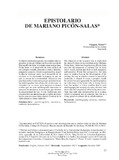| dc.rights.license | http://creativecommons.org/licenses/by-nc-sa/3.0/ve/ | |
| dc.contributor.author | Vásquez, Víctor | |
| dc.date.accessioned | 2017-12-01T14:51:37Z | |
| dc.date.available | 2017-12-01T14:51:37Z | |
| dc.date.issued | 2017-07 | |
| dc.identifier.issn | 0798-1570 | |
| dc.identifier.uri | http://www.saber.ula.ve/handle/123456789/44091 | |
| dc.description.abstract | El objetivo de la investigación, fue estudiar cómo se presenta, la idea de Cultura en el escritor merideño Mariano Picón-Salas. A la mejor manera hegeliana, Picón-Salas ve el desarrollo de vida cultural en tres tiempos: mundo, demonio y carne o infierno, purgatorio y paraíso. Desde esa perspectiva, surgió la idea de explorar cómo en el desarrollo de su escritura se va plasmando la manera en que un país se inserta en la modernidad. Al parecer una paradoja nubla el panorama porque aparentemente las autobiografías son reflejos del escritor que va viviendo; eso es cierto, pero tampoco es menos creíble que en cada autobiografía interviene la
memoria de una época, de un tiempo, que instaura la temporalidad del ser. Y, esa verdad que nos circunscribe a un una época, que se repite, no como hecho concreto sino como espiral vivencial de la vida cultural se llama tradición. | es_VE |
| dc.language.iso | es | es_VE |
| dc.rights | info:eu-repo/semantics/openAccess | |
| dc.subject | Autobiografía | es_VE |
| dc.subject | Memoria | es_VE |
| dc.subject | Tradición | es_VE |
| dc.subject | Hermenéutica | es_VE |
| dc.title | Epistolario de Mariano Picón-Salas | es_VE |
| dc.title.alternative | Epistemary of Mariano Picón-Salas | es_VE |
| dc.type | info:eu-repo/semantics/article | |
| dc.description.abstract1 | The objective of the research was to study how the idea of Culture in the meridian writer Mariano Picón-Salas. In the best hegelian way, Picón-Salas
sees the development of cultural life in three times: world, demon and flesh or hell, purgatory and paradise. From this perspective, the idea arose to explore how in the development of his writing, the way in which a country is inserted in modernity is shaped. It seems a paradox clouds the picture because apparently the autobiographies are reflections of the writer who is living; this is true, but neither is it less credible that in each autobiography the memory of a time, of a time, that intervenes the temporality of the being intervenes.
And, that truth that circumscribes us to a time, which is repeated, not as concrete fact but as a living spiral of cultural life is called tradition. | es_VE |
| dc.description.colacion | 23-38 | es_VE |
| dc.description.email | vasquezvictoj@hotmail.com | es_VE |
| dc.description.frecuencia | Semestral | |
| dc.identifier.depositolegal | PP92-0047 | |
| dc.identifier.edepositolegal | ppi201202ME4019 | |
| dc.identifier.eissn | 2244-8438 | |
| dc.publisher.pais | Venezuela | es_VE |
| dc.subject.centroinvestigacion | Centro de Investigaciones Literarias y Lingüísticas Mario Briceño Iragorry | |
| dc.subject.facultad | Núcleo Rafael Rangel (NURR) | es_VE |
| dc.subject.institucion | Universidad de Los Andes | es_VE |
| dc.subject.keywords | Autobiography | es_VE |
| dc.subject.keywords | Memory | es_VE |
| dc.subject.keywords | Tradition | es_VE |
| dc.subject.keywords | Hermeneutics | es_VE |
| dc.subject.publicacionelectronica | Cifra Nueva | |
| dc.subject.seccion | Cifra Nueva: Estudios | es_VE |
| dc.subject.thematiccategory | Artes y Humanidades | es_VE |
| dc.subject.tipo | Revistas | es_VE |
| dc.type.media | Texto | es_VE |


